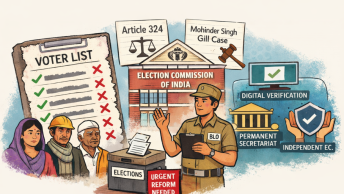Summary: In this article, the author argues against reverse onus clauses, both theoretically and pragmatically to establish that such clauses lead to some unimagined and undesirable consequences which do not actually reach the identified goals of these stringent special laws.
Introduction
The presumption of innocence (‘POI’) is one of the fundamental principles of procedural criminal law, which mandates an individual to be presumed innocent until explicitly proven guilty. The POI is more than a principle of evidence. The POI plays an important role in balancing the competing interests of the state. The state must prevent wrongful convictions which lead to substantial moral and socio-legal harm, while also ensuring an effective criminal process which punishes those who commit crimes. Here, the POI and procedural fairness guarantees seek to strike a balance between these interests and the fundamentally unequal players participating in the criminal process.
However, reverse onus clauses which flip the POI, and place the burden of proof on the accused to prove their innocence are becoming more commonplace in the criminal justice system. These clauses are usually found in ‘special’ legislations which create distinct legal and political regimes which often seek to apply to special situations which the general law (the IPC for example) is unable to combat. Since the offences that such special legislations seek to combat affect the public at large and are considered graver, the state assumes greater onus on itself to prevent such crimes by making use of reverse onus clauses.
One such legislation employing the reverse onus clause is the Narcotics Drugs & Psychotropic Substances Act, 1985 (‘NDPS Act’). Section 35 provides for a presumption of culpable mental state during the prosecution of any offence under the NDPS Act, while Section 54 creates a presumption of guilt arising from the possession of certain illicit articles with the accused. Legislated in the context of meeting India’s treaty obligations in the 1980s, the NDPS Act introduced reverse onus clauses and other stringent provisions for the control and regulation of narcotic drugs and psychotropic substances. Given that nearly 79 thousand cases related to possession and other offences under the NDPS were reported, it is imperative to ponder the role of such sections.
Through this article, the author attempts to critically analyse reverse onus clauses and their various justifications. Using the example of the NDPS Act, the author argues that justifications for reverse onus clauses are based around the alleged exceptionalism and seriousness of the crime sought to be addressed as well as other practical concerns. It is concluded that not only are such defences theoretically unsound but also lead to unacceptable and unjust consequences in the context of the NDPS Act.
Truly special? Questioning the Exceptionalism of the NDPS Act
The apex court in 2008 held Sections 35 and 54 as constitutional. In Noor Aga, the court justified the provisions by arguing that a reverse onus clause must be ‘tested on the anvil of the State’s responsibility to protect innocent citizens’. Therefore, these clauses which limit the human (and not fundamental) right that is the POI, would have to be weighed against the purpose of the specific contextual limitation. The Court, while recognising the stringent nature of the Act, created a rebuttable presumption against the accused which would only exist if the prosecution satisfied the initial burden of establishing the actus reus beyond reasonable doubt. Thus, prosecutorial burden in NDPS trials is to establish either constructive or physical possession of illicit substances with the accused. Once this threshold is met, the onus on proving whether such possession was with requisite animus is on the accused.
On a theoretical level the court justified the constitutionality of these clauses by relying on the underlying exceptional nature of the problem of narcotics and the grave seriousness it warrants, in spite of recognising their potential misuse. This seriousness and exceptionalism which cannot be combatted without anything but a stringent, punitive law permits a more relaxed application of foundational principles like the POI.
This legal position is particularly problematic, as the reverse burden of proof ensures that all types of offenders are treated uniformly without taking into consideration the usage of the drug in question. By failing to distinguish between first-time offenders, addicts or smugglers, the Act heavy-handedly disproportionately overcriminalises with about 67% of NDPS cases being filed for possession for personal use and consumption in all NDPS cases.[1] Coupled with other punitive provisions like the possibility of imposition of the death penalty after previous conviction, harsh bail conditions and no possibility of commutation/remission in some cases, the outcome remains ones which is supply oriented, rather than one which rehabilitates abusers and reduces demand.
Some Theoretical Discomforts
The problem of narcotics as evidenced by the law commission, seems to be one that threatens the very integrity of the country. However, can mere seriousness of the problem be a justification for reverse onus clauses? If so, why does the POI exist for other serious offences like murder or dacoity? How does then one decide which offence is serious and which is not to create differentiation between offences for which reverse onus clauses may be introduced?
The seriousness argument fails as it subjugates the POI to public interest and tilts the balancing scale in the favour of the state. In situations where the alleged offence is grave in nature, protections in favour of the accused become more essential to prevent greater deprivation of liberty. Some argue that it is in an equal public interest to ensure the existence of the POI to ensure no person is wrongfully convicted due to reverse onus clauses. POI not only protects the accused, but also maintains public confidence and integrity in the legal system. Therefore, the bogey of seriousness of the offence cannot be a principled justification for the reverse onus clause since any offence could potentially be serious enough to justify invoking the reverse onus clause.
Another justification in favour of reverse onus clauses is that such clauses save prosecutors, investigative agencies and the judicial machinery considerable time and money by allowing for quicker trials. Furthermore, especially in possession offences, it is argued that the given the special knowledge of the accused with respect to the possession of the illicit substance, it is practically difficult for the prosecution to prove the mental element of the accused.
However, these arguments make a fundamental flaw in equating special knowledge of the accused with the ability to prove a fact in issue. Even though the burden of proof on the accused is of preponderance of probabilities, meeting this burden may prove difficult due to the accused’s lack of resources. Given that the state through its agencies has more power and resources to combat crimes, the state can prove guilt with greater ease than an accused their innocence even with some special knowledge. At the heart of this entire debate rests the assumption that proponents of the reverse onus clauses must necessarily deal with, which is that the state and the individual accused are inherently unequal in their relationship. It is this very inequality that the POI attempts to address.
In the context of NDPS Prosecutions, evidence shows the disastrous impact of reverse onus clauses. In Punjab, investigative agencies follow certain template-based narratives in police chargesheets, displaying the superficial investigations conducted by the police. Thousands of cases are characterised by the same set of circumstances in which the investigative agency purportedly finds the accused in the possession of illicit items. In 2021, from the total convictions arising out of the NDPS trials, nearly 82% of the convictions in all NDPS matters were of those charged with possession and personal use.[2] This displays the disproportional impact on individuals operating individually leading to overincarceration of young, socio-economically weaker individuals who are unable to prove their intentional element. Given the pendency rate of 91% in all NDPS cases, the argument of quicker trials is also tough to swallow.
Therefore, the reverse onus clause permits the police to deliberately conduct shoddy investigations knowing that the accused would not be able to defend themselves, leading to greater convictions. This displays that under the garb of difficulty in proving guilt, the prosecution abdicates its responsibilities, and allows for an accused by subjected to extremely harsh deprivations of liberty without the actual problem of trafficking being solved. Thus, the legislature has not been able to provide any principled justifications for the introduction of reverse onus-clauses. Similarly, the Judiciary, in holding the reverse onus clause constitutional in Noor Aga has failed in providing an adequate defence to reverse onus clauses.
Conclusion
The reverse onus clauses under the NDPS Act display the disparity between their imagined and real outcomes. Not only do such clauses fail to combat the perils which are used to justify the Act’s punitive character but also end up leading to grave deprivations of liberty. These deprivations themselves highlight the urgent need to reassess such clauses. On a theoretical level as well, it is difficult to accept the justifications of seriousness, special knowledge of the accused and administrative efficiency. However, the balancing between the POI and reverse onus clauses can never really be solved by any court, until liberty is prioritised and the imbalance of power between the mighty state and the accused is fully understood.
[1] See National Crime Records Bureau, ‘Crime in India 2022’ Vol. 1, page 7. In 2022, the total cases registered under the NDPS Act were 1,15,236. Out of these, 77,172 (or about 67%) were registered for Possession of drugs for Personal use/Consumption and 38,064 (about 33%) were registered for possession for trafficking.
[2] NCRB, ‘Crime in India 2022’ Vol. 3 Page 1155. The total convictions in 2022 in NDPS cases were 35,879. Out of these, 29,468 convictions (around 82%) were in cases of Possession of drugs for Personal use/Consumption. Only 6,411 convictions (around 22%) were recorded for possession of drugs for trafficking.
Rehan is a 3rd year student at National Law University Delhi. He is interested in criminal law, constitutional law and tech law.
[Ed Note: This Article has been edited by Nupur Barman and published by Harshitha Adari from the Student Editorial Team.]








[…] Posted byRehan […]